|
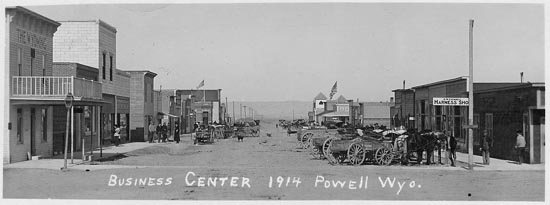
Powell, Wyoming, 1914.
In this image, two new buildings have been constructed on the two vacant lots on the other side of the hotel.
Farlow's meat market is next door to the hotel.
Sidewalks have been constructed. Across from the hotel, the building on the corner has been occupied by
Glen W. Cockrell's harness shop. As depicted lower on the page, the site of Cockrell's harness shop would
later be occupied by the two story First National Bank of Powell.
In 1909, M. D. Wright, a lumber wholesaler from Coeur d'Alene, Idaho, constructed the Wright Building into which
MacGlashan's Powell Mercantile moved.
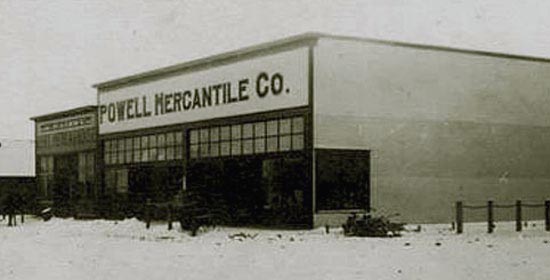
Wright Building, 1909.
Next door to the Wright Building was the Libby Building.
The Wright Building cost $7,000 to construct. The Libby Building cost $3,000. A. P. Libby served as the
first mayor of Powell. In February 1910, MacGlashan awoke in his quarters in th back of the store to the smell of
smoke. A fire had started in the cellar of the building. He dashed out of the building in his bare feet through the snow
to arouse help and get water from the well. The building together with $20,000 worth of stock which
MacGlashan had just purchased was a total loss as was the Libby Building. Libby was able to save
most of his stock and reopened in the vacant pool hall. MacGlashan, after getting married, moved to
Cheyenne where he served as a deputy Secretary of State. He then moved to Big Piney where he was secretary of the
Cretaceous Oil Company. In October 1917, MacGlashan drove to Kemmerer to pick up some used
drilling equipment which he was going to take to Casper to be reworked. Near Sublet Springs, his Ford was found overturned.
Apparently a front tire had blown, the car rolled. The drilling equipment in the back seat hit him in the
back of his head and he was killed instantly.
In 1919, in another large fire the Globe Garage, the Buick dealership, burned with damages estimated at $50,000. Damaged or lost in the
fire were 41 motor cars. When the fire started, the mecanic on duty had difficulty in removing vehicles from the garage as the door
was partially blocked by a large Hudson which he had difficulty in starting. Only four years before the total number of cars in
Powell was 24 out of a total of 129 in the county.
The Powell Mercantile was not the only large mercantile store in
town. Martin Luther Pratt (1870-1940) and his brother Charles (1876-1967), also in 1909 opened
the Pratt Brothers Big Store.
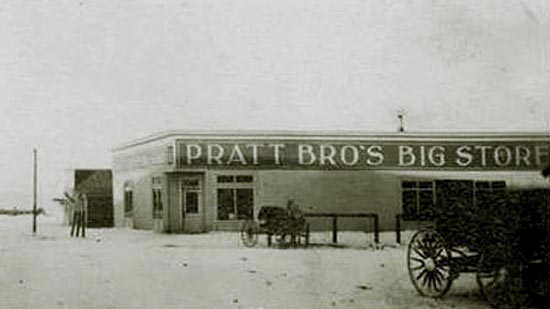
Pratt Bros. Big Store, 1909.
M. L. Pratt served as mayor. Both of the brothers played baseball and manageed local teams. Baseball was important.
Teams from Powell played teams in Lovell, Cody, Meeteetse and Manderson as well as other teams in Powell. The cames were all
featured in front page stories in the Tribune, sometimes, however, tongue in cheek. One such story appeared in the
Tribune on May 15, 1914, reported a game between Ole Johnson's boys from the
Reclamation Service and Tim O'Keefe team composed of businessmen of the town:
An After-Supper Contest
What is said to have been the greatest baseball contests of the season -- if not the greatest in the history of the game
-- was that played on the local diamond Tuesday evening of this week between the "O'Keefe's bunch of "has beens"
and Ole Johnson's crowd of "never weres."
The "never weres" managed to win by the score of 11 to 9, but the "has beens" claim thaey had to play elven men, and Bowers unpired and Lakisch kept score. The chae is even made that
"his umps" exercised a wholly imporoper influence upon the game, going so far in one
inning as personally to receive the ball from the catcher and make a put-out at second. We
decline to be drawn into controversey over this matter, as the provocation was
understandably great, and then too, we are not informed as to size of the bet. But the bright, particular star was Timothy O'Keefe, whose hoe
run on a foul fly was the feature of the game. Longley's work in left field was of that
finished character usually seen only in the professional; he made his only catch of a fly ball to the
outfied during the game. The have was a hummer for the number of errors and solen bases, the scorer requing the frequent administation of
koxygen to enable him to land the five innings. Doc Mains and Wright were the slab artists, and while we dout not in the
pink of condition were there with the goods in a pinch. It is rumored that a scout from the Federal League is looking over this pair, but it is not believed money would induce them to
get back again into the game.
Let's have more of these contests.
At the time, the game absolutely was one of greatest baseball contests of the season. It was only the second
game. The first game held the previous week was between Charley's Pratt's "aggregation of city baseball artists" and Billy Sawtell's "hay seeds."
That game went twelve innings. William A. Sawtell (1888-1963) was a rancher. In 1915 and 1916 there were two regular teams, the Powell All Starts and
Company C of the Wyoming National Guard. Sawtell pitched for Company C.
For discussion of the Federal League, see Greybull.
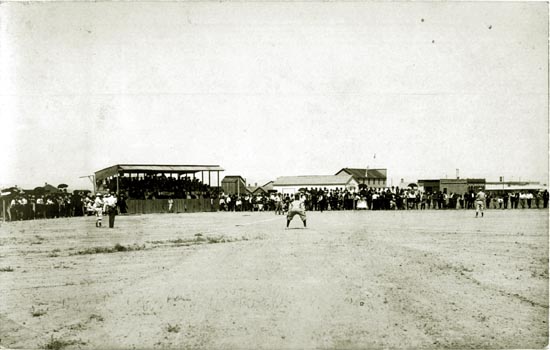
Powell, baseball game, 1911.
In 1912, Pratt was elected on the
Republican ticket as a representative from Park County. In the election, Republicans won a
majority of the seats in the House, 30 Republicans to 27 Democrats; that is, until two Republicans were,
in the words of John Charles Thompson, Jr. of the Wyoming State Tribune, were "seduced" by the
Democrats to proclaim themselves as Progressives and vote in the organization of the House with the
Democrats. In the case of Pratt, the Democrats had to pay a price, the election of Pratt, a freshman
representative, to the Speaker's chair. A Democrat was selected as speaker pro tem. The uproar was immediate.
The election of a United States Senator hung in balance, for in those days senators were elected by
the State Legislature. Ten days later, a sheriff from West Virginia attempted to arrest the
other former Republican on a ten-year old forgery charge. Speaker Pratt, with visions of being
selected as United States Senator or even the governorship, had an epiphany, saw the light, and converted back to the
Republicans. The Democrats, having bribed with the speakership Pratt to convert to their party, now accused the
Republicans of having bribed Pratt with money. The scene in the House looked like a bar-room fight when
Speaker Pratt physically threw the Democratic speaker pro tem from the rostrum. Things ultimately
returned to a mild uproar and Senator Warren, a Republican, was safely returned to Washington.
Perfidity has a price. Needless, to say, Pratt's visions of the governor's chair or a Senate seat as
well as reelection came to naught and he crawled back to Powell with his tail between his legs.
The store expanded under the name "Pratt-Mann Company" into having stores in Deaver, Garland, Greybull and Midwest. In March 1920,
there were signs that the stores were in financial difficulty. In March the store in Deaver was sold. On April 28, 1920, the
Company was adjudicated as a bankrupt At the bankruptcy sale, the stock and business in Powell was purchased by the
Rodgers Mercantile Company. Charles Pratt's house was sold to photographer A. G. Lucier. Apparently, there were no
immediate buyers for Martin Pratt's house and it was rented out. Both Martin and Charles left town in April 1921 for
Judith Gap, Montana, with
Martin's household goods in the back of Will Loomis' Maxwell truck. In Judith Gap, the two were going to manage
a cooperative store. Martin Pratt apparently did not stay long, In 1922 he was spotted in Big Horn County. By 1930 he and his familty
had returned to his original home town in Portage County, Wisconsin. Charles ultimately ended up in New Jersey.
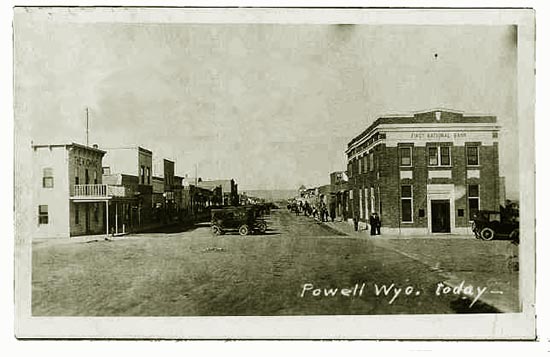
Powell, Wyoming, 1920's.
The
town was incorporated in 1909 and became a part of newly-formed Park County upon its
formation in 1911.
By 1919, most the the claims by settlers had been proven up and
conveyances of farms on the Powell Flats north and west of the town had been completed.
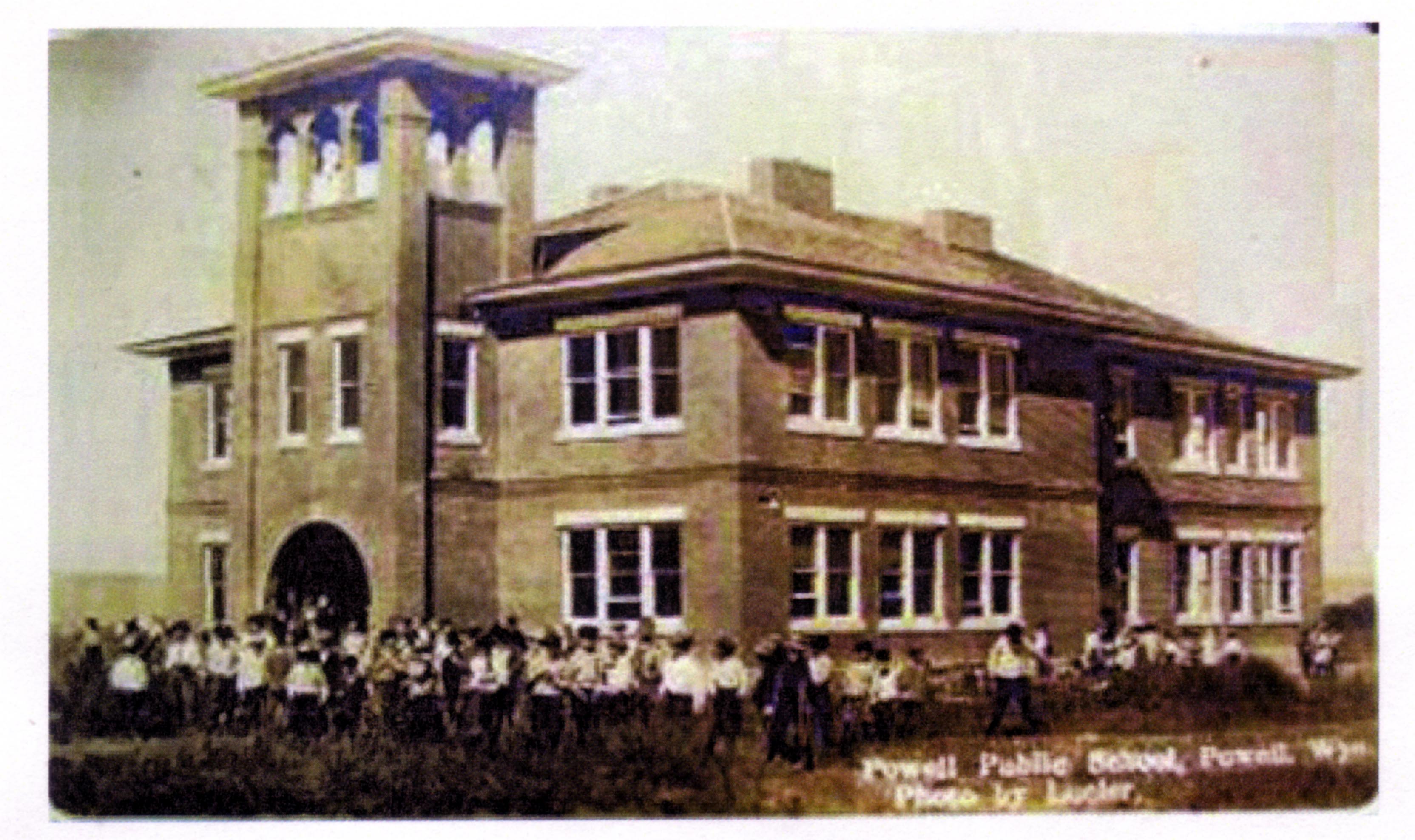
Powell, Wyoming, High School, 1914. Photo by A. G. Lucier.
The gowth of Powell continued apace. Not withstanding the above school, by 1919, three classes were required to be
conducted in the bank building. The same year,
Next page: Powell continued, Company C, Wyoming National Guard.
|